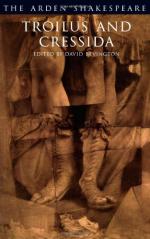|
This section contains 8,076 words (approx. 27 pages at 300 words per page) |

|
SOURCE: “Shakespeare's Troilus and Cressida: Of War and Lechery,” in Colby Quarterly, Vol. 26, No. 2, June, 1990, pp. 133-48.
In the following essay, Faber remarks that while Troilus and Cressida has been regarded by many critics as a “problem comedy,” it is better described as a problem tragedy for which Shakespeare could not or chose not to provide a satisfactory conclusion.
Commentators have generally agreed that Shakespeare's Troilus and Cressida is one of his “problem plays.” Others include All's Well That Ends Well, Measure for Measure, and sometimes Julius Caesar; less frequently, Hamlet and Timon of Athens are named. For critics, identifying the actual “problem” in a problem play, determining what causes the difficulty, and theorizing about how to solve it have traditionally represented three separate analytic tasks. I would like to treat all three as interrelated aspects of one critical misconception about Troilus and Cressida—that it is a...
|
This section contains 8,076 words (approx. 27 pages at 300 words per page) |

|


